TECHNICAL DIVING COURSES WITH VICTOR CORDOBA
- Have you listened to the technical diving call?
- Do you want to surpass recreational diving limits?
- Do you wish to explore underwater places only a few people in the world can see?
You are on the right page.
Victor Cordoba tech diving courses are the training you were looking for to break your limits.
TEC, SIDEMOUNT, TRIMIX, REBREATHER, and CAVE DIVING.
The Technical diving training is independently imparted by known and experienced Course Director, Victor Cordoba. You will learn how to comfortably and safely dive beyond your usual recreational dive parameters.
- Go deeper than 40 meters / 130 feet.
- Visit wrecks and caves you could not visit in any other way.
- Learn to use gas mixtures, decompression procedures, and rebreathers & dive tech to go beyond what you ever dreamed.
- To become a Tech Diving Instructor TEC, SIDEMOUNT, TRIMIX, REBREATHER, and CAVE DIVING.
“Don’t limit your challenges. Challenge your limits.” Said Jerry Dunn. Now, you make the decision: keep doubting or contact the Course Director right now.
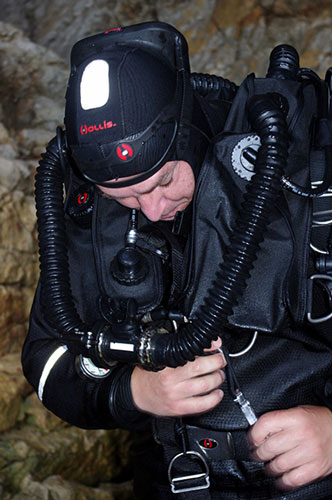
TECHNICAL DIVING COURSES CATALOGUE
TECH DIVING COUSES USEFUL FOR RECREATIONAL & TECH DIVERS
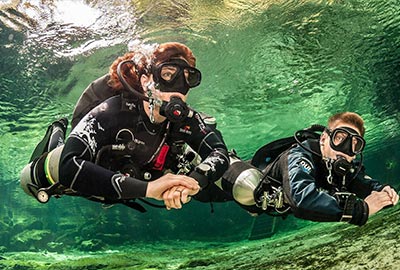
IANTD TECHNICAL SIDEMOUNT
Give your back a rest from carrying the cylinder with our IANTD Sidemount Tec Diver.
Side mount tec diver certification is very popular with cave divers, deep exploration divers, and extended range tec divers. Now it is also spreading to recreational diving. This is because sidemount allows you to configure many cylinders in an optimal way.
Sidemount Tec Diver courses offer you a more handled approach to tec scuba gear configuration.
You will learn how to set up a sidemount harness and the advantages. The Sidemount Tec Divers course consists of one confined water session and four open water training dives. During these dives, you progress from two cylinders to at least four in total, perhaps even to as many as six tanks.
Prerequisites: Be at least 18 years old, and an Advanced Diver and have a minimum of 30 logged dives. (Recommended: an Enriched Air Diver certification).
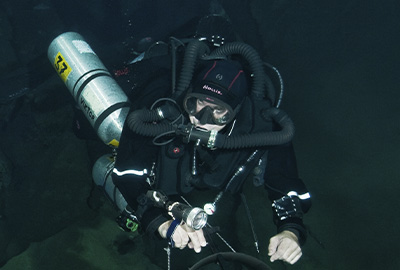
IANTD REBREATHER DIVER COURSES
Taking this technical scuba diving certification, you will learn to dive with a rebreather. It allows you to really extend your bottom time and reduce your gas consumption, recycling and reusing it.
Like the marine wildlife itself, you will not emit bubbles and enjoy very close encounters. Once considered only for technical divers, it is now available at the recreational level also.
The IANTD Rebreather Tec Divers Courses will introduce you to the world of oxygen recycler diving with a limit of 18 meters / 60 feet. It is a great way to start diving with a rebreather and you will experience the ocean in a much more intense way than what you are used to. Rebreather technology has evolved tremendously to be much more lightweight and easier to transport. Moreover, sophisticated electronics make them much more user-friendly, and simple to use for everyone interested.
Prerequisites: Be at least 18 years old, be an Open Water Diver with a minimum of 25 logged dives, and Enriched Air Diver.
TECHNICAL DEEP DIVING COURSES FOR TEC DIVERS
IANTD ADV EANx
It is a tech diving introduction course to experience decompression dives at the 40 meters/130 feet
The course technical diving gear requirements only impose a few add-ons to your standard scuba equipment allowing you to enjoy this level of diving with little extra investment in equipment.
There is also no need to acquire complete specialized diving gear at this point unless you plan in any case to continue all the way to Technical diver.
Note: Bring a Medical Statement signed by a physician. This statement should not be older than 12 months.
Prerequisites; Be at least 18 years old, an Advanced Diver, a Deep Diver, Enriched Air certified, and have a minimum of 30 logged dives of which at least 10 to 100 feet / 30 meters and 10 to 60 feet /18 meters with enriched air nitrox.
IANTD TECHNICAL DIVER
Taking this tech diving certification, you will learn how to make extended, accelerated decompression stops with the use of up to two different gases opening the possibility of deeper diving adventures.
Also, you will learn the entry-level skill to enjoy open circuit deep decompression diving.
You finish the technical diving training fully qualified but within the limits of your training and equipment, to do decompression diving. The tech diving certification derives its name from the fact that you learn the above decompression techniques to progress to 50 meters/165 feet.
Note: Bring a Medical Statement signed by a physician. This statement should not be older than 12 months.
Prerequisites: Be at least 18 years old, an IANTD Adv EANx Diver (or equivalent from any other certifying agency or federation) and have a minimum of 100 logged dives, of which at least 15 to 60 feet /18 meters and 20 with enriched air nitrox deeper than 60 feet /18 meters.
IANTD NITROX AND TRIMOX BLENDER
Want to become a Tec Gas Blender? Dressel Divers, in its tech diving destination, offers the Tec Gas Blender Course for those that want to be qualified to properly provide certified Tec divers with tanks of mixed gases.
Our Gas Blender technical diving training will qualify you as a Gas Blender by teaching you the physical properties of oxygen, how to safely handle it and the five ways of producing enriched air nitrox mixes with it.
You will learn the proper techniques required to create correct helium mixes. The Gas Blender course for technical divers includes practical classroom sessions, but no open water diving.
Tec divers learn how to blend enriched air nitrox and helium-gases using one or more blending methods and about their advantages and disadvantages.
You also learn how to mix enriched air and trimix to within one percent of the target mix. The potential hazards and correct management techniques related to oxygen handling, including the requirements for oxygen service are also covered.
Where Does Victor Offer These Technical Diving Courses?
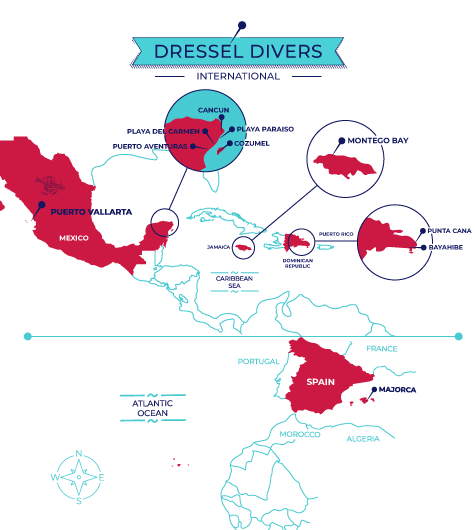
Important Information
- Victor Cordoba exclusively offers technical diving courses in camp format and by prior online booking through him.
- He has the flexibility to organize a technical camp at any of our destinations, provided that a reservation is made well in advance, and candidates apply as a group of at least 6 students.
- Participants are required to bring any technical equipment required for the experience beyond our standard dive gear rental possibilities.
VÍCTOR J. CÓRDOBA GRACIA CV
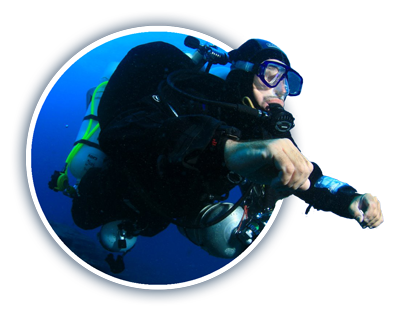
Victor is a marine biologist and professional scuba divier with more than 30 specialties and 25 years of experience as a diving course teacher. In addition, his log book includes 6000 dives in places as diverse as: All along Mediterranean Coast in Spain, Red Sea, (Sharm el Sheik, Hurghada, Marsa Allam, Zabargad, Brother Islands), Maldives Islands, Madeira Islands, Roatan, Malaysia, Mexico (Cozumel, Playa del Carmen), Dominican Republic (Punta Cana, Bayahibe, Puerto Plata), Florida Springs (Caves), Palau Islands (Micronesia), Jamaica, Canary Islands, Mallorca Island, France, Italy, Sweden, United Emirates…
University Education
Degree in Biochemistry. University of Valencia (Spain) 1984 – 1989
Marine Biology Specialty. University of Valencia (Spain) 1989 – 1990
Languages: Spanish, English, French, Italian
Technical (tec) diving means going beyond recreational scuba diving limits.
The National Oceanic and Atmospheric Administration (NOAA) defines tech diving as “all diving methods that exceed the limits imposed on depth and/or bottom time for recreational scuba diving. Technical diving often involves the use of special gas mixtures…
… Tech diving almost always requires one or more mandatory decompression “stops” upon ascent, during which the diver may change breathing gas mixtures at least once…”
Many times, what began as a hobby, in time turns into a need, even into a career. Tec divers want to break the limits of decompression, overcome the recreational depths, or dive in caves, and not only in caverns. In other words, their goal is to conquer places where only a few people can go.
Those who decide it’s time to go for tech diving, prepare themselves by attending more and more advanced diving courses. Through these courses, they learn to use different mixes of gases, different configurations of equipment, and a different way of “focusing” a dive. As their scuba knowledge and diving hours increase, their abilities and skills increase with them. Then, the limits of recreational diving disappear to welcome a new way of diving; Technical Diving.
There are different agencies where a diver can learn to become a technical diver, the most known are IANTD, TDI , GUE – Global Underwater Explorers, or PADI TecRec, but there are other ones.
It depends on the technical diving certification level you want to take. For rebreather tec diving courses the diver just needs a be at least 18 years old, be an Open Water Diver with a minimum of 25 logged dives, and be an Enriched Air Diver.
Meanwhile, to take part in a Tec 50 course you need be a PADI Tec 45 diver, having a minimum of 100 logged dives, with at least 20 dives on enriched air nitrox deeper than 18 metres/60 feet and 15 dives deeper than 30 metres/100 feet.
Yes, there are.
There is not just one type of tec diving. The truth is that there are different situations where advanced knowledge or tech diving is necessary.
Deep diving, for example, starts with dives beyond 130 feet/ 40 meters. In this kind of technical diving, it is absolutely impossible to make a direct ascent to the surface and decompression stages are required.
In addition, knowing about different mixes of gas can help you make your dive longer, decrease surface intervals, safety stop times, and help with the elimination of nitrogen.
But tech diving also challenges the limits in overhead environments such as wrecks and caves. The reason is that this form of scuba diving takes you more than 70 feet (21 m) deep or farther than 200 linear feet (60 m) from the cave entrance. Cave tec diving means technical divers cannot exit and ascent directly from the cave to the surface. There is a rocky ceiling to remind them of this. Again, they will need tech diving training to enjoy this in a safe way.
Different depths, distances, technologies, and environments combined bring diverse types of technical scuba diving, such as deep diving in shipwrecks, diving under the ice, or scuba diving with new technologies.
You cannot put limits on people who don’t have limitations…
Well, that’s right, we admit they have limitations. Some years ago, 100 m (328 feet) was a goal for tec divers. Currently, tec divers usually go deeper than 100 m, and their new aim is 200 m (656 feet) deep.
The deepest tech dive on open circuit scuba stands at 332.35 m (1,090 ft 4.5 in) by the Egyptian Ahmed Gabr. The main limitation is that diving with heliox deeper than 150-180m (500-600 ft) causes high-pressure nervous syndrome (HPNS. A neurological and physiological diving disorder).
The record for the deepest dive on a rebreather was set at the Boesmansgat Cave by Australian David Shaw, who descended to 270 meters (886 feet) on October 28th, 2004. These devices’ main limitation is their implosion in the abyss.
Technical divers may work in the range of 170 feet to 350 feet, sometimes even deeper. In an experimental dive done by Comex, a French diving company, a tec diver went to 2,300 feet (701 meters) for two hours, which is the deepest a human has gone under pressure (71.1 atmospheres) to date.

